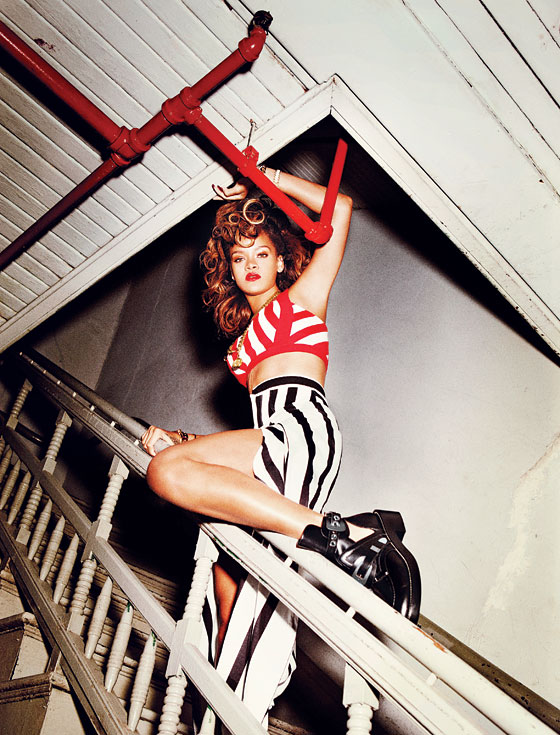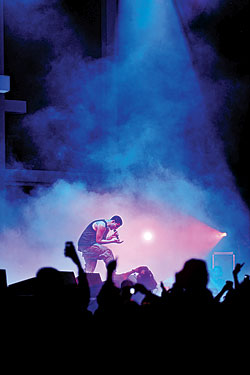
‘I think you become disposable when you put out an album every three years.” So says Jay Brown, longtime manager for the Barbadian pop singer Rihanna—by which he means you need to produce more than that. Like Rihanna, who’s released one album per year since the summer of 2005. (Okay, she skipped ’08, but it would be petty to count that against her.) This schedule isn’t much compared with the fifties or sixties, when singers like Frank Sinatra and Sam Cooke might release three or four studio LPs in a single year, but these days it’s notable. It means there’s nearly always a new Rihanna single ready for the radio or the charts so she never has to win back anyone’s attention. More impressive, the singles are almost always pretty good—no easy feat.
“It’s not like we force her,” Brown recently told the BBC. “She goes into the studio because she likes it.” (Rihanna doesn’t even have to “go” there; she brings a mobile studio on tour.) There are two types of stars this routine can work for: those so full of personality that everything they do is interesting, and those so devoid of if that they can clock in, efficiently dispatch a solid pop hit, then grab a few hours’ sleep before the next day’s appointments. Rihanna is totally the latter, and the kind of music that has recently dominated pop—thumping, ecstatic dance numbers like “Only Girl (In the World),” from her 2010 album Loud—has been kind to her: It requires a reasonably strong singer, but not a ton of personality or emotion. Give her a good pop hook and she will put it across with professionalism, verve, and (at her very best) even a hint of playfulness. At her worst, you get a kind of joyless disinterest, but in the right light she can pass that off as steely confidence. I have no doubt that, as Brown says, nobody’s forcing her. What I doubt is that the results would be much worse if someone were.
On her new album, Talk That Talk, the production line is catching up with Rihanna. The record sounds rushed: The songs will take one good idea and hastily stretch it to full length. Ideas are thin on the ground; worse, the mood is strangely unfun. Rihanna has cycled through a lot of personas, none of them incredibly convincing, but lately she’s focused on telling us all that she really enjoys sex. (Rihanna telling us she enjoys sex is like her manager saying nobody’s forcing her to record; it’d never have occurred to me to think otherwise until they mentioned it.) Sex is a rich and noble topic for pop, and sometimes it’s empowering to insist on it, the way Rihanna does here: “I want you to be my sex slave,” “I wanna fuck you right now,” “I’ma give it to you baby.” But it’s startlingly depressing to deliver those lines in the dispassionate voice of a bored professional. By the time she sings “I’ve been a bad girl, Daddy,” it sounds like she’s halfway through a double shift, and I find myself wishing her a solid vacation.
For one of Rihanna’s exes, the massively popular Toronto rapper-singer Drake, output is similarly high (three albums in as many years), but for very different reasons. Drake must produce music at a quick clip for the same reason last week’s episode of a reality-TV show needs to be followed by this week’s episode and yesterday’s blog posts need to be followed by today’s. More than any other successful rapper—yes, even Kanye West—Drake’s music is self-reflexive: His great confessional topic is what it’s like to be Drake, to experience the situation Drake is experiencing, publicly, right this minute. Some of the deftest lines on his new album, Take Care, are the ones where he raps about how people perceive him, while simultaneously trying to affect how people perceive him. What’s amazing is that this level of meta is a totally ordinary quality in today’s pop and hip-hop worlds—not to mention the world of listeners publicly performing and presenting and perceiving themselves and one another, day in and day out, on Twitter or Facebook or YouTube or in the halls of a school somewhere. Being incredibly conscious of this process has ceased to seem especially postmodern or self-aware and might now just be called, roughly, “life.”

Drake’s critics might call his approach overemotional, sad-sack, or wimpy, but his version of masculinity is simple, and can be observed anywhere young men are hitting on people: First you act grave and sensitive; then you convey how weighty and fraught with complexity your life is; then you chin up and demonstrate how stoic and manly you are about it. This can be attractive, and Drake isn’t exactly duplicitous about it. “Having a hard time adjusting to fame,” he says, drunk-dialing an ex on “Marvins Room”—quickly followed by “I need someone to put this weight on.” (Calling him a sad-sack just adds weight; now he’s misunderstood, too.) Drake, it has to be said, is fantastically compelling in this role. Self-presentation isn’t just his great topic; it’s also his great strength.
Plenty of fans would follow him for that alone, in the same way you might follow a personal blog by someone you found charming. What really stuns, though, is Drake’s ear for sounds. Take Care is full of gorgeous tones: atmospheric, moody, muted music that can turn suddenly gushing and lavish. And the lyrics surrounding them can be rich with meaning, like on “Look What You’ve Done,” which begins with Drake rapping about taking care of his ill mother—the big moment wherein even the cynical may admit that his masculine burden-shouldering might be for real. But that moment works because we all have families, or something like them. It works so well that you might start wondering about the rest. We spend a lot of time now watching stars whose whole performance is how they react to being watched and made famous. It can make for good entertainment, even good art, but there’s not always a lot of invention involved. A record like Take Care only hangs together if you’re ready to stipulate that the fact of Drake making a record is fascinating in itself.